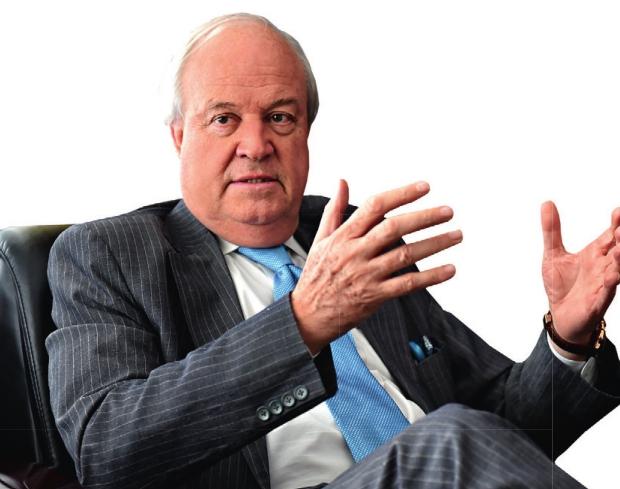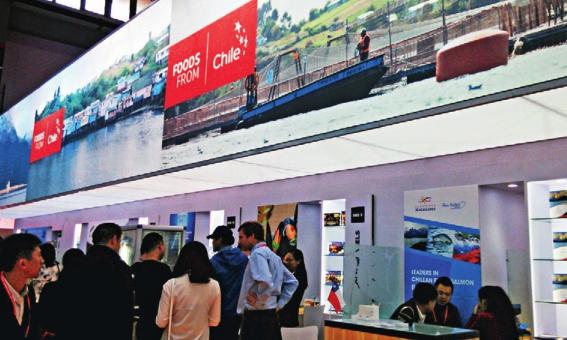“The China-Chile FTA Was the Right Decision”
By staff reporter MICHAEL ZáRATE



THE year 2016 marks the 10th anniversary of the coming into force of the China-Chile Free Trade Agreement (FTA), a milestone given that it was the fi rst FTA China signed with an individual country. To take stock of bilateral trade, China Today talked with the Ambassador of Chile to China, Jorge Heine, who also gave us his perspectives on the future of the Chinese economy.
China Today: Over the last 10 years since the signing of the FTA, trade between China and Chile has qua- drupled, China now accounts for 25 percent of Chilean foreign trade.
Jorge Heine: Too true. One in every US $4 that Chile earns from exports comes from China. This is particularly interesting in view of a report shortly before the FTA was signed, predicting that Chilean exports would grow only three percent, while imports from China would rise to around 15 or 16 percent, which has not happened. On the contrary, Chilean exports have increased 15 to 16 percent annually over the last 10 years, and Chinese imports have also shown healthy growth. So it has been a good deal for both parties.
China Today: This was the fi rst FTA China signed with a country individually. As would be the case for any pioneering decision, the agreement undoubtedly raised fears and reservations. What was the situation in Chile at that time? What was said?
Jorge Heine: This brings up two issues. The first one concerns Chilean foreign trade policy, which has had several strands. One has been to seek a bilateral or multilateral FTA with the rest of the world, which at the time caused considerable controversy. Although certain people thought this inadvisable, Chile nevertheless opted to move towards Asia. The second issue is Chinas situation. As we know, China commands vigorous trade and tends to have trade surpluses with the vast majority of countries. The latter aspect was of serious concern to Chile. However, the FTA ended up being the right decision, and we currently have a trade surplus. Today we must look for ways to further develop and deepen the FTA.
China Today: Both countries are now negotiating the deepening of the FTA. What aspects are being discussed, and which do you think should be highlighted, Mr. Ambassador?
Jorge Heine: Certain sectors, namely, government procurement, f inancial services, and e-commerce, were not included in the 2005 FTA. The latter is a good example. Chile now makes purchases mainly through AliExpress of the Alibaba Group. Last Easter four million packages came to Chile from Asia, two million of them from China, mostly via AliExpress. It is thus clear that e-commerce should be incorporated into the rules of international trade, as so far it is not. The same goes for various financial services. There are a number of ways in which we want to strengthen our trade ties with China.

China Today: Mr. Ambassador, you are a supporter of the potential for the Chilean food sector in China, having once said it could be a “big-bet country,” bearing in mind that Chile is generally more associated with its mineral resources. How will the FTA enable this “big-bet country” to somehow diversify the trade relationship?
Jorge Heine: The FTA has been essential to this purpose. First, Chile has focused on exports of fresh fruit and other foods since the late 1970s. We therefore have considerable expertise in this area. But there are those who believe that fresh fruit exports have low added value, and that we would be better advised to can fruit or process it into juice. I think this is a deeply misguided approach. Exporting fresh fruit adds tremendous value to the product, involving as it does the harvesting, packing, and shipping of the healthy product that is then presented on supermarket shelves. Although not easy, Chile has the necessary expertise to accomplish this. And taking into account the zero duty payable on Chilean fruit and other food products entering the Chinese market, Chile has a comparative advantage over its competitors in this sector. The FTA has therefore been critical to, and had extremely positive impact on all of Chiles exports to China. In 2005 they earned US$90 million, and today the figure stands at around US $1.2-1.3 billion. Chilean exports have also risen 70 percent annually, which is impressive by anyones standards.
China Today: On the subject of fresh fruit, Chile is indeed the second largest exporter to China. In fact, in 2015 it became the countrys first supplier of fresh blueberries and cherries. How important was the China factor in the six percent annual growth of Chilean agriculture?
Jorge Heine: The FTA has been fundamental in this respect. The Minister of Agriculture of Chile, Mr. Carlos Furche, knows China very well, having been director of international economic relations of the Ministry of Foreign Affairs, and also one of the officials who negotiated the FTA with China. On his most recent visit to Beijing last January, we noted that annual growth of the Chilean economy was around two percent, while that of the agricultural sector was, at six percent, three-fold. One reason is the strong demand from China, not just for fresh fruit, but also for wine. In 2015 China became the largest market for Chilean wine, displacing the U.K. So this is a classic instance of diversification.

China Today: Mr. Ambassador, which of the topics in Chinas 13th Five-Year Plan are of greatest interest to you?
Jorge Heine: What most caught my attention was Chinas commitment to innovation, and how this has been identified as the main engine of growth for the Chinese economy over the next five years. There has long been a commonly held view that there is little innovation in China. Many think Chinese companies are skilled only at copying products, but I personally think this is changing. This we can see in a number of products, such as high-speed trains, or the devices produced by Huawei, which is a leader in the mobile and smart phone sector. But we are not only talking about products, but also processes. E-commerce in China, notably the Alibaba Group, is the global vanguard, and is carrying out proactive marketing innovation. Chinese commitment to innovation is a very interesting bet.

